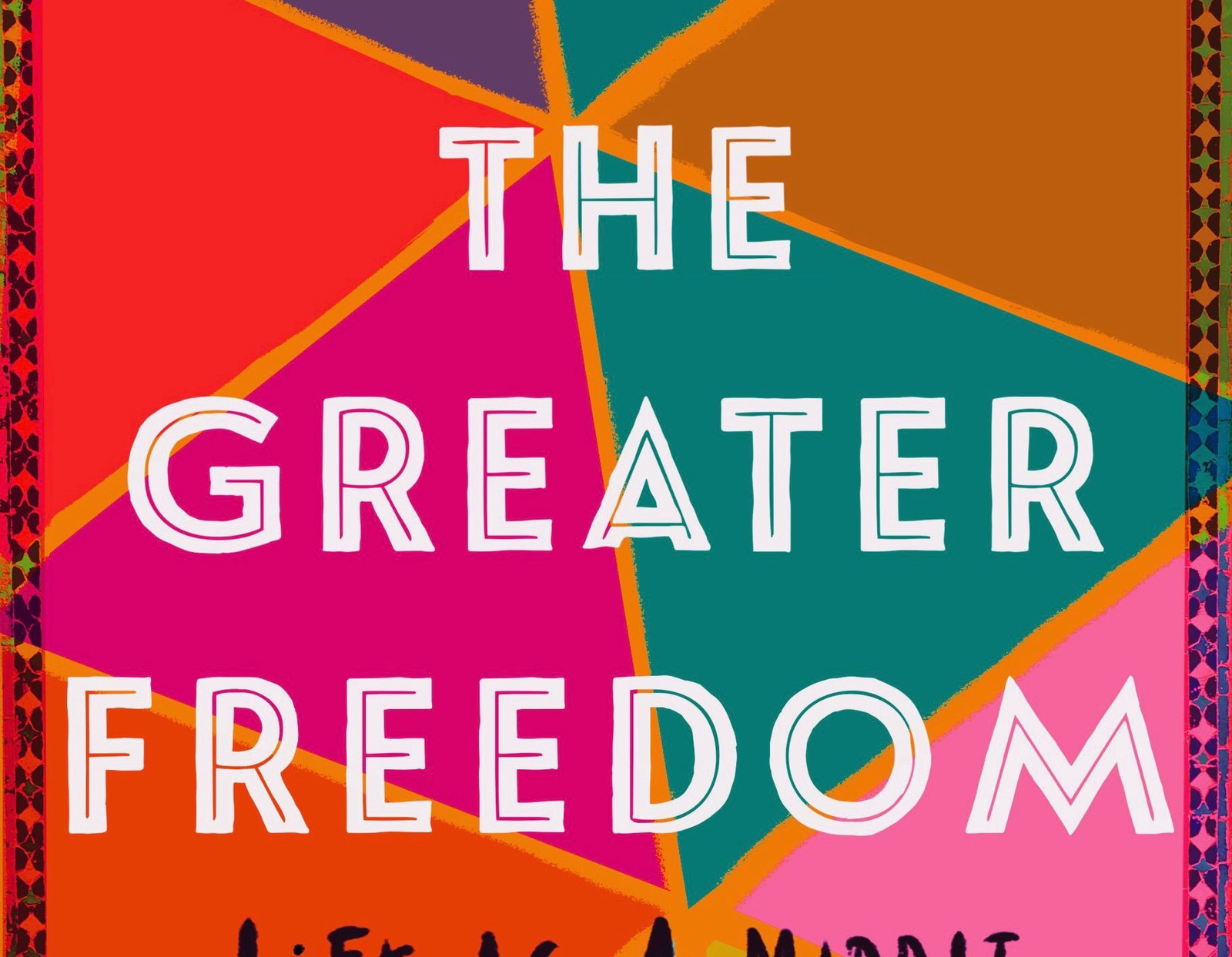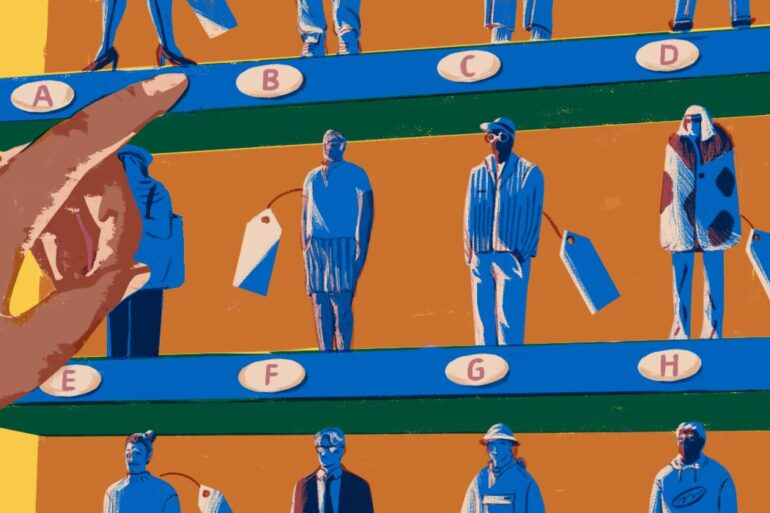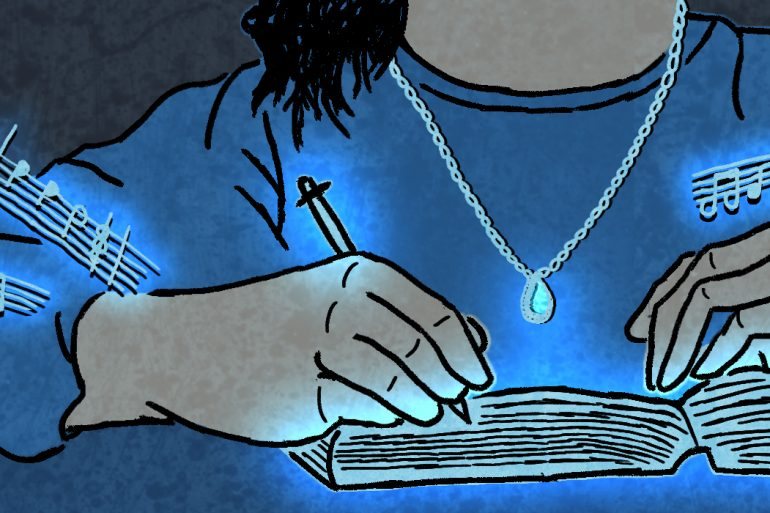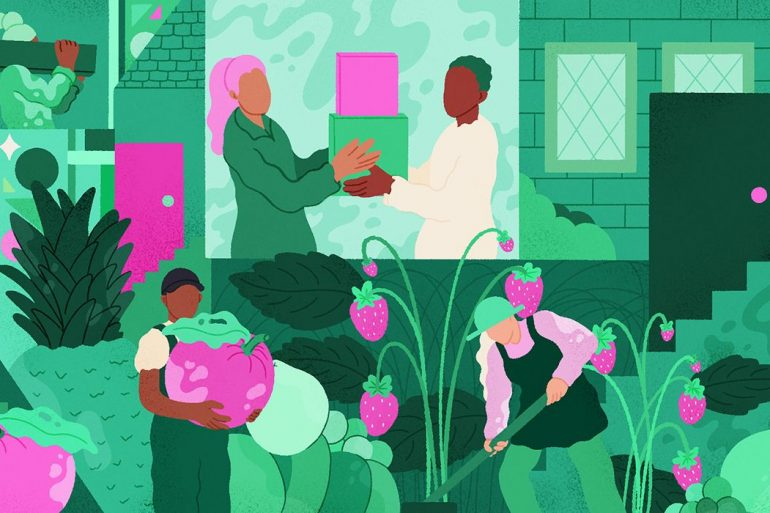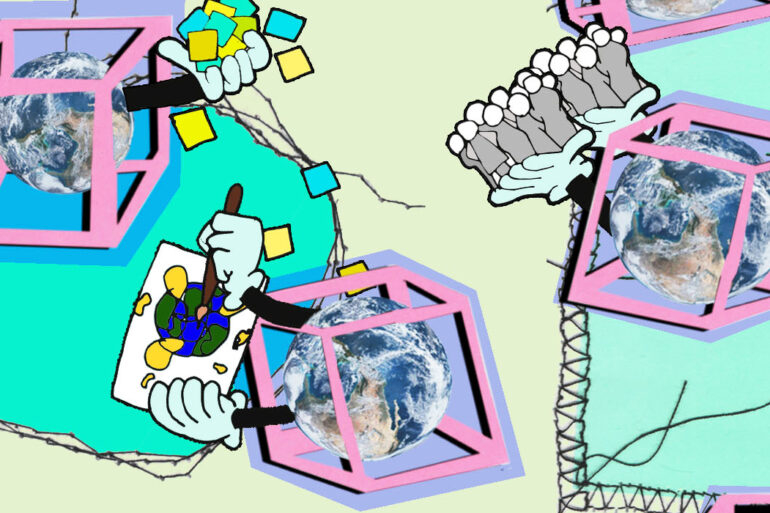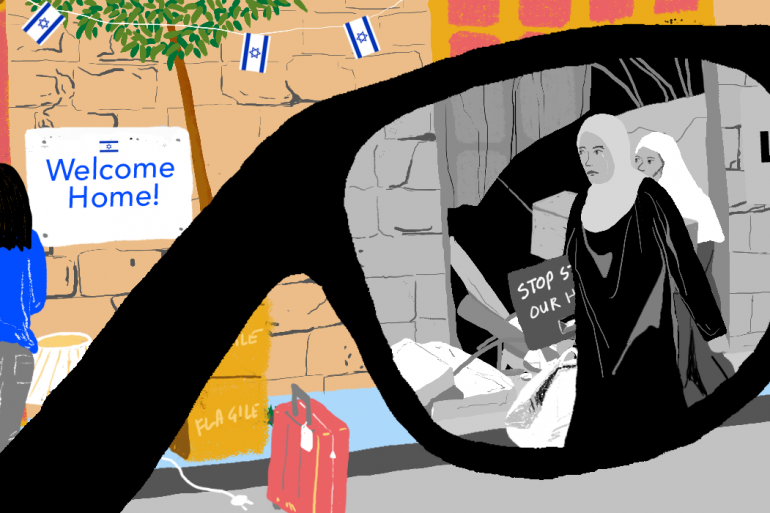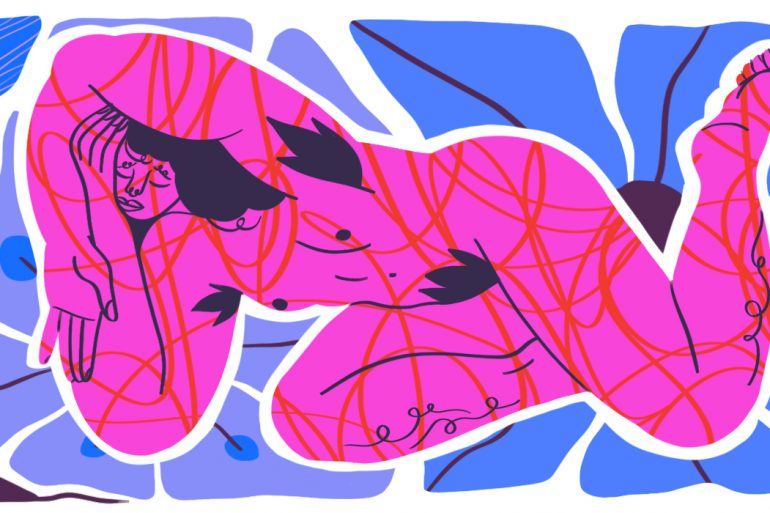shado sat down with Cairo-born, London-raised journalist, Alya Mooro to find out more about her debut book, The Greater Freedom: Life as a Middle Eastern Woman Outside the Stereotypes.
We received a message from Alya on the morning before we were supposed to meet at midday, asking us to push back by an hour or so. After being warmly welcomed into her West London flat, she apologised for this. “You’ll think this is crazy,” she laughed, “but I had to delay the interview because I had to get my hair straightened. I was determined to wear it curly for the photoshoot, but then this morning I looked in the mirror, and just wanted to wear it straight. I prefer it that way! I know I’m not supposed to, but I just do.” We talked more about this in the interview, along with her journey, the themes she explores in the book and in particular, why it was so important for her to write her own story into it. “People like me exist, and I felt it was really important to push past the fear, and to write about it.”
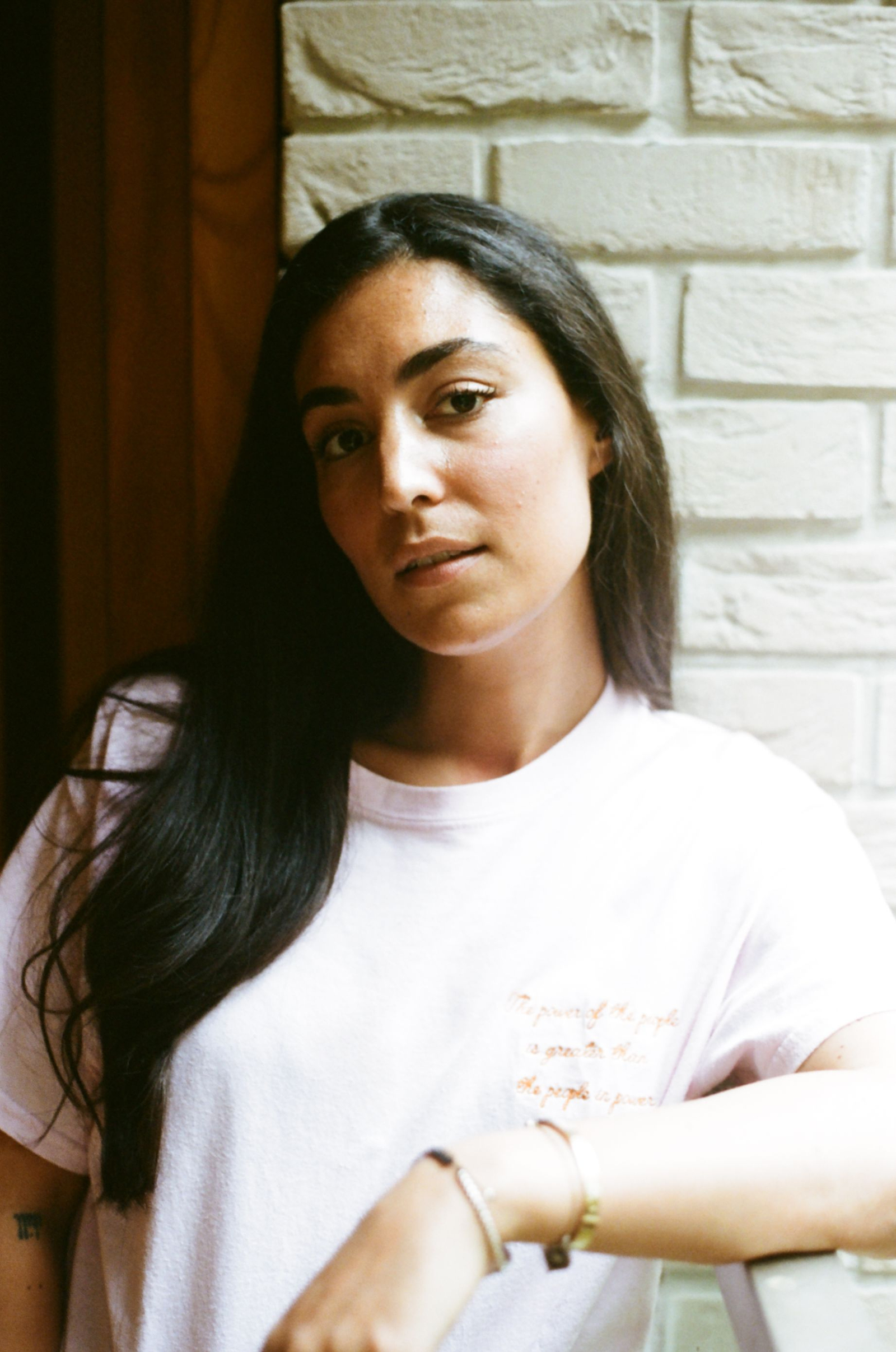
You mention Nawal el Saadawi as being a big influence on this book – when did you first discover her work and how has this influenced/informed your own perspective? Do you identify with her as becoming more radical as you get older?
I actually didn’t come across her work until I was already writing The Greater Freedom, which was really heartbreaking; I wish I had read her work earlier! When I read ‘The Hidden Face of Eve’, it made me feel like I was on the right track. Everything she wrote about verified what I had been thinking and feeling. Something that was so amazing as well, that I discovered when reading, was that she had been in the same class as my grandfather, and she had written about him in her book!
Reading Nawal el Saadawi’s work was really mind-blowing for me; it made me realise that there have been so many people in different countries that have been fighting for the same things – things that in many ways, we are still fighting for. It made me feel like we have come some way, but that there is still a long way to go. In that sense, she gave me courage to keep going and to speak my truth.
In terms of the second part of your question – I don’t know if the word is radical. I feel like it’s more, maybe, that I’ve gained more courage as I get older. I have more conviction in what I’m saying and I care less about what people think – and I definitely hope that that is something that I continue to do. I really believe so strongly that we should be free to make our own decisions.
You quote the brilliant Nikesh Shukla, editor of The Good Immigrant, in also identifying as an “invisible immigrant.” Can you talk a bit about how problematic it is to be categorised as ‘good’ and how this feeds into anti-immigration sentiment as a whole?
I think it’s important to be good humans, in terms of treating others and ourselves with respect, but that people can be held to different standards because of the colour of their skin or where they were born is dangerous and unfair. It’s a topic I touched on in Chapter 12: When You are Both and Neither, where I quoted Afua Hirsh who, in her book Brit-ish writes about how this guy on the train was speaking really loudly, and it made her feel like she needed to distance herself from him so she wouldn’t also be regarded as a ‘bad immigrant’. At the end of the day, no country has ever been just one thing; people have been moving for generations, and migration has always been at the heart of globalisation. It’s really important to not ‘otherise’ people, because at the end of the day – who is really wholly from anywhere?
“Just as the West stereotypes all Arab women as being oppressed, the East’s stereotype of Western women is often that they are all morally loose” – both of which are rooted in misogyny – did you feel caught in the middle of both of these essentially patriarchal systems?
Yeah, definitely. Unfortunately, it took me a really long time to see these things, but in hindsight it’s clear I was caught between these two systems. When I moved to Egypt, a lot of boys in my class thought that I’d hook up with them – that I was a “hoe” just because I’d grown up in London, while in the UK the stereotypes surrounding women the Middle East precede me.
This is another reason why feminism needs to be intersectional – because it’s patriarchy that we should be fighting against.
It’s not each other, or each other’s definitions of what it means to be a feminist. I think we can really get caught between two different stereotypes, and they are both as bad as each other. And neither are correct. It just leads to judgement and oppression, on different levels which all comes back to the patriarchy.
Did you actively take to social media as an alternative space/site of autonomy or did you find that it developed into that naturally?
Being active on social media is something I’ve always been really comfortable with. I had an anonymous blog when I was 12, and I made friends on there… Even when I was then writing articles as a journalist, I’d always put call-outs out on Twitter or Instagram to find people to interview, or for their opinions. So, it was very natural to do that with The Greater Freedom. I’ve been talking about a lot of these topics with a lot of my friends for a really long time so it was amazing for it to go beyond that; to talk to women that I had never met and for them to feel so many of the same things – it gave me further conviction to tell this story and to provide an alternative narrative, one that I don’t think is being told enough. Social media has definitely helped me gain this broader perspective, and contributed to making the book more inclusive and relatable. The women I spoke to live all around the world and are way beyond my social circle, but there are the things that we all, as women, can relate to, and have in common.
That’s another thing we’re interested in – what do you hope that both Arab and non-Arab people – not just women – take from the book? Is it the same thing, or is it different?
In a way, it’s the same thing. I hope that it helps people to unpick their own expectations and stereotypes – that they place both on themselves and on other people. There are things that we all have in common. So many different people have been reading this book and telling me that they find things that they relate to. That’s because it’s a human story. I hope that we can all interrogate the expectations that have been placed on us; as women, but also as humans. We all have so many things that society or religion or family or culture or the media have told us that we should be, or should want. I want us to unpick all of that, and to be who we really are away from outside pressures. That’s why the book is called ‘The Greater Freedom’, because that’s ultimately what it’s about: freedom to be ourselves.
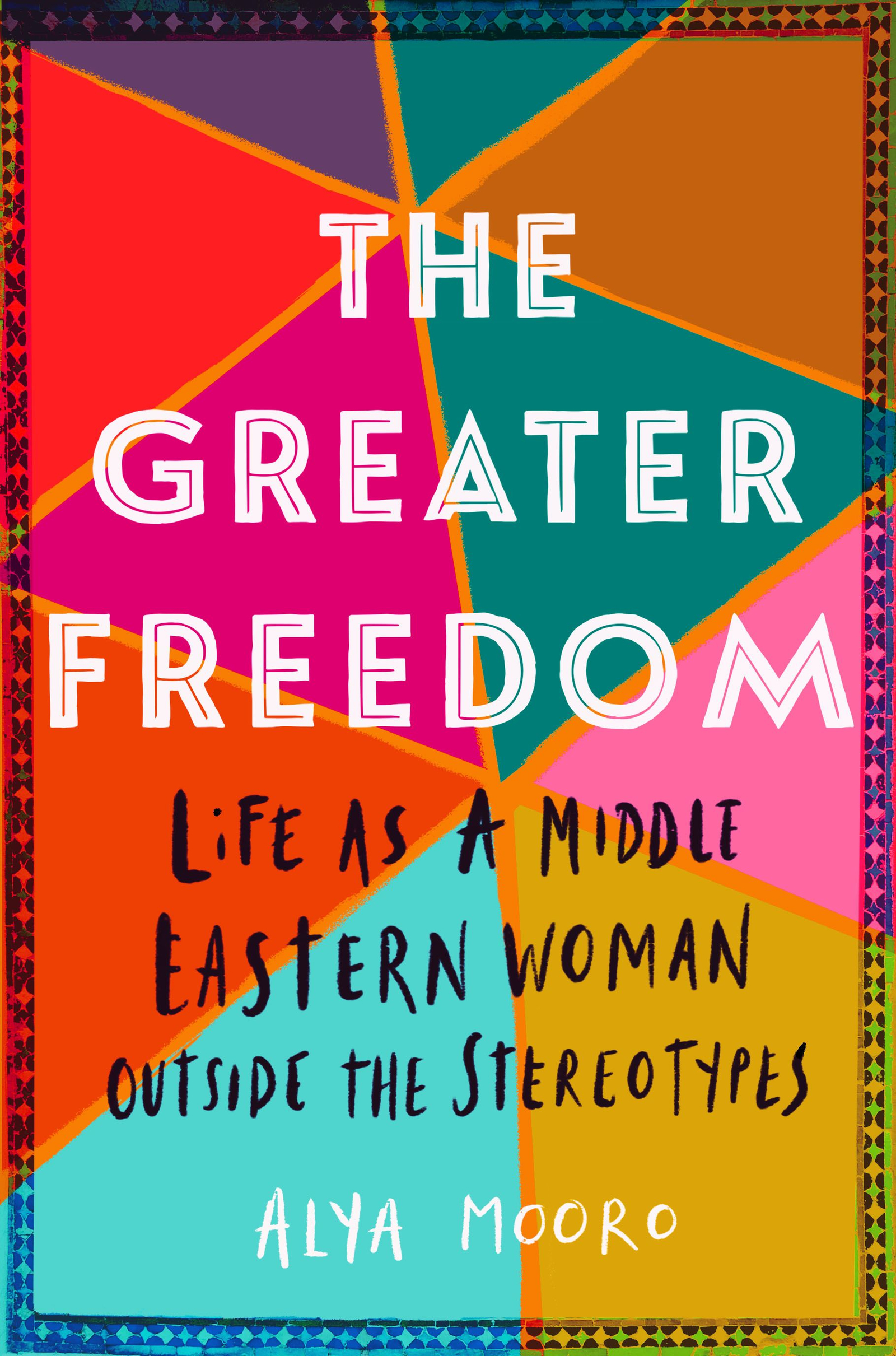
This idea of expectation – you wrote in your Foreword, “The word ‘should’ will come up a lot” (xiii) – when you look back on your life, do you still feel the weight of expectations or can you distance yourself from this?
I definitely feel like writing The Greater Freedom helped me to free myself from those expectations in many ways. I think a lot of this burden of expectation and fear of what people might say came from my mum, but my mum had also inherited these things herself. For a long time she was the symbol of this invisible jury, in a way, but it’s been so incredible to see her response to the book, as reading it has helped her change her mind and free herself of this burden, too.
But, it’s weird, sometimes it’s a burden, almost, to be “too woke”. It’s like I was saying before, I’ve looked into all of this, and I’ve unpicked it all, so I know that I’m brainwashed into thinking certain things – for example that straight hair is better – so I feel like, with that knowledge, I now have to wear my hair curly and like it that way. But I don’t! That’s kind of where I’m at right now – I’ve really unpicked all of this, and I feel like I’ve really got to the root of all these things, but what happens if I still believe it? What happens if I want to straighten my hair? And I think that’s the thing – to understand that that can also be okay! Because that is my own personal preference.. I think it comes down to choice. So, it’s interesting, because I’m still figuring it out – but I definitely feel like a lot of the burden has been lifted through writing the book.
Subscribe to shado's weekly newsletter
Exclusive event news, job and creative opportunities, first access to tickets and – just in case you missed them – our picks of the week, from inside shado and out.

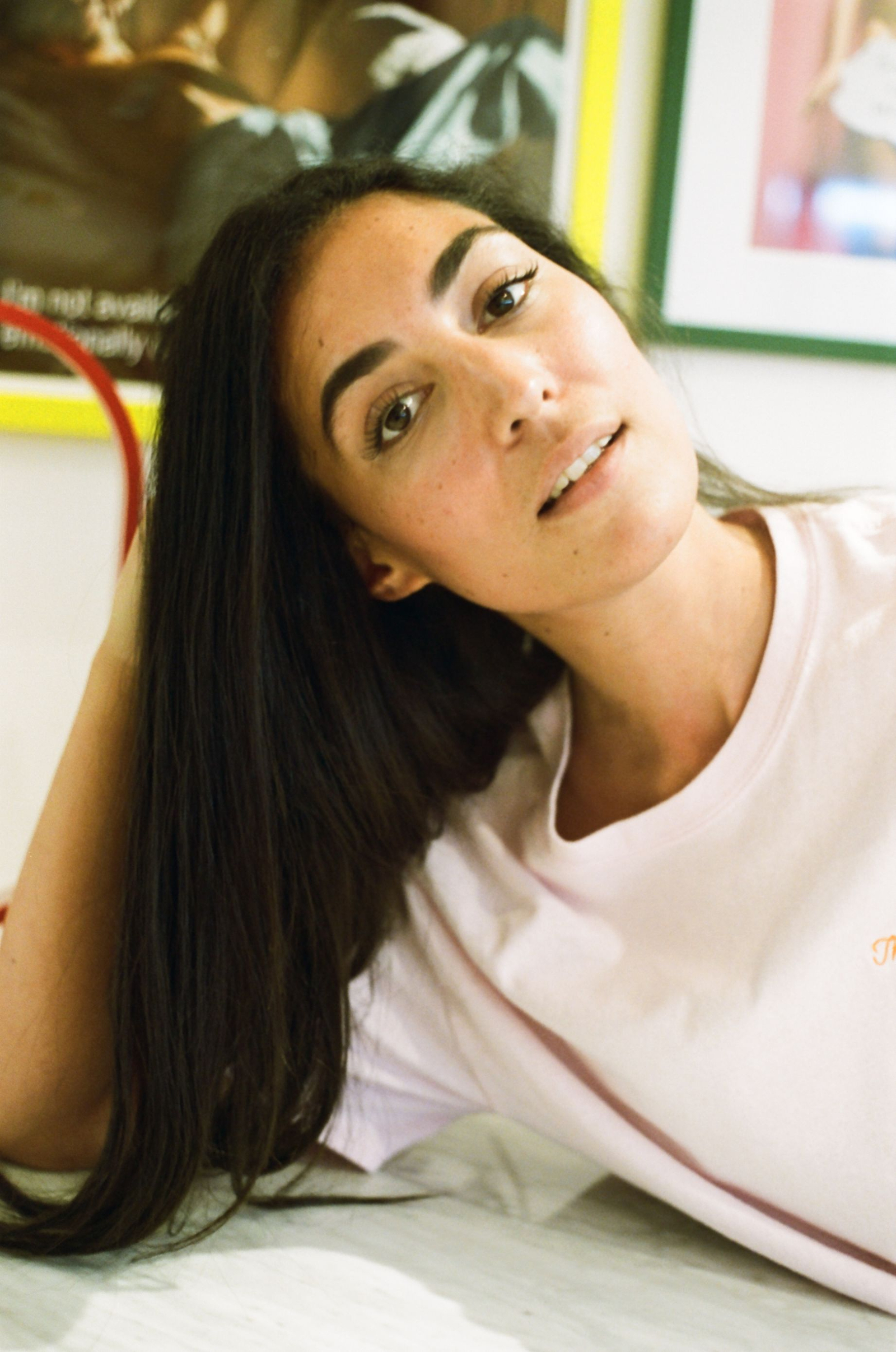
That’s interesting, because we wanted to ask why it was important in your own journey to write this book now, but it’s clear that writing the book was part of your journey; it’s propelled you further.
That’s true. In terms of why it was now, for a long time I wasn’t paying attention to these things, and I was instead just rebelling. Once I had broken up with my boyfriend, which was about four years ago now, I suddenly realised: I couldn’t have sex! That’s basically what made me write the book. I just didn’t understand why I was slut-shaming myself. There was no reason for me to have this voice in my head, but I did and it made me really want to unpick these thoughts and feelings. It was really bothering me, and I knew I had to write about it – because if I have this burden of shame and guilt, other people will definitely have it too.
The whole idea of guilt and sexuality goes back to that East-West stereotype – and if you’re stuck in the middle, how are you meant to know how to think? That being said, throughout the book, you realise how similar these stereotypes actually are – they aren’t rooted in culture, or religion, but are subconscious attitudes that have been passed down. It’s also clear from these books, such as yours, and others like Brit-ish – when you have a dual identity, you realise that place doesn’t define who you are.
I think we need to unpick this more and more. I really think that we are at this sort of crossroads, you know? We’re all kind of fed up with living in this patriarchal world; maybe, we could go one way, towards more freedom, and more openness, and more understanding – or we could go the opposite way, towards hatred, and othering – and we’re in the middle right now. I think it’s really important for us all to do everything we can to go towards the path of openness and understanding. Globalisation is happening more and more; there are more and more people with parents from two different countries; more and more people are living in countries that they’re not originally ‘from’ – so, I think it is the question of our time, more than ever before.
Over the course of the 12 chapters, you cover themes from sexuality, beauty, marriage, religion, media representation and immigration – what chapter are you most proud of, or was the most difficult to write, and why?
I think the religion chapter was the most difficult, because it is such a difficult subject to broach. I was scared from both sides. I was most scared of the super religioso people turning around and saying, “fuck you, you’re not Muslim, what are you saying.” Which, to be fair, they could say about the whole book, and then I was also scared to pander to the negative stereotypes the West can have about Muslims. I tried really hard to be balanced. I did a lot of research for all of the chapters, but maybe mostly for Chapter 10: When You are ‘Technically’ Muslim, because I wanted to make sure I really knew what I was talking about. And again, I didn’t want to offend anyone. That I was so scared made me feel like it really had to be done.
Because, we can’t live in this world where we’re scared to talk about things that matter. People like me exist, and I felt it was really important to push past the fear, and to write about it.
Going back to a lot of the women who you quote – can you tell us a bit more about the relationship you had with your social media following and the other women you interviewed for this book?
I think what was so lovely, when I would speak to these women – and especially the ones that I didn’t know – is that it felt like an instant bond. I think, in many ways, it was things that we all know, or have felt for a long time, but that maybe we haven’t been asked, or maybe we haven’t been given the opportunity to talk about. I feel like I’m building such a nice community on social media, and there’s so much that I want to do off the back of this, in terms of continuing to facilitate those conversations, because there’s so much to talk about. I feel like the book is acting as a catalyst, and making people know they’re not alone. It’s been amazing.
How do you feel now the book is out? Has the process of writing and research led you to want to explore any areas further in your writing?
It feels really surreal! People are sending me messages telling me how reading The Greater Freedom has changed their opinions and how they relate to their families, or to their children. It’s making people feel more seen and more accepting of themselves. It’s an incredible feeling the book is having so much impact on reader’s lives already. There’s a lot more that I want to do in terms of telling more stories, especially stories that are not really in the mainstream; to keep providing alternative narratives to the really reductive ones that are out there – firstly, because I know what a difference it can make, to feel like you can see yourself, and secondly, because of the response it can generate. I’m seeing that people are really hungry for these alternative narratives, and it’s our responsibility, as people who can, and as creatives, to provide them.
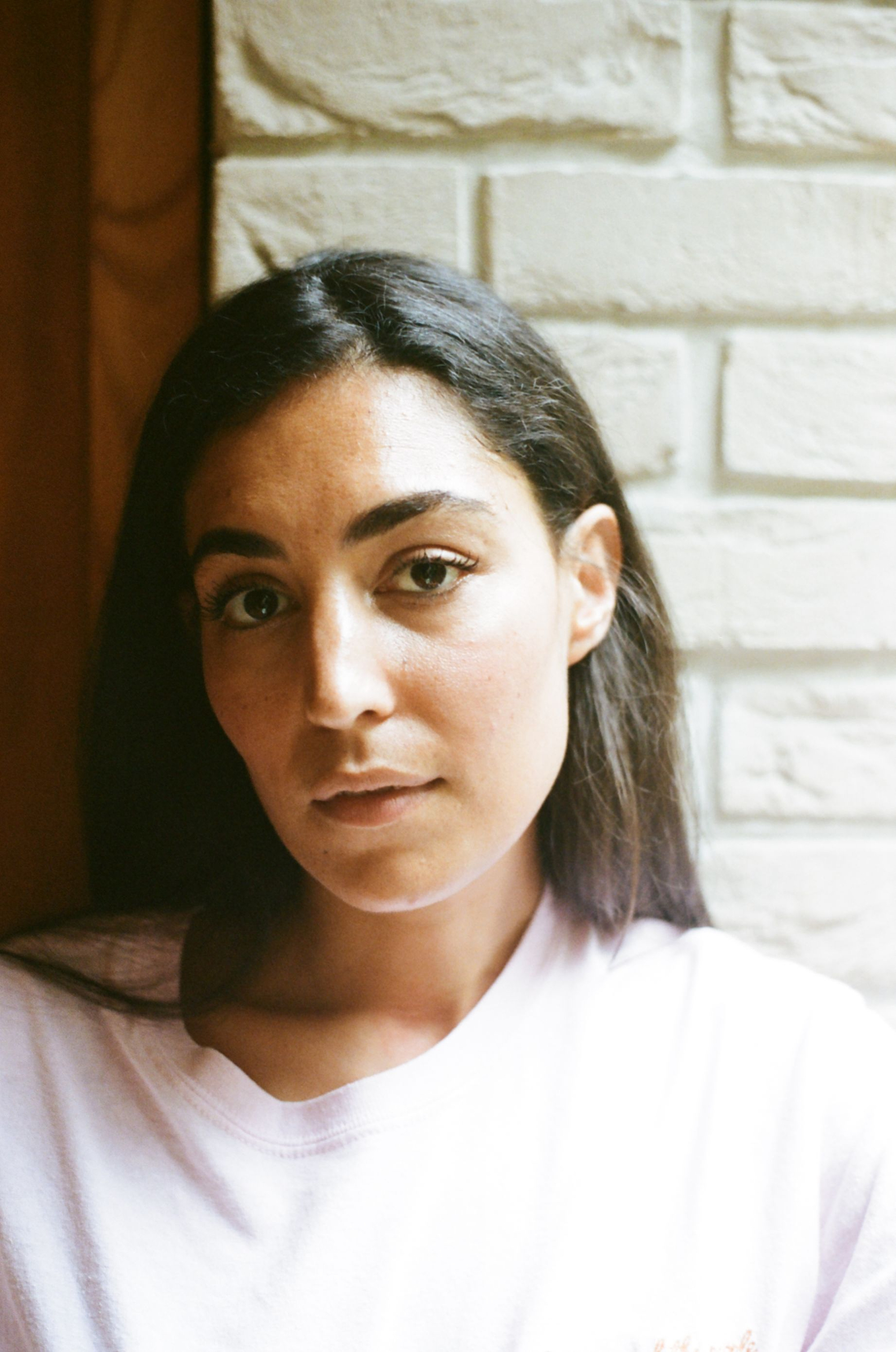
~~~~~~~Extract below from The Greater Freedom, pp.68-69~~~~~~~~~~
In reality, just as the West stereotypes all Arab women as being oppressed, the East’s stereotype of Western women is often that they are all morally loose. Author and humanitarian Zainab Salbi suggests that these stereotypes are often shaped by images from the mainstream media depicting nudity or near-nudity everywhere, explicit discussion of sexual acts and behaviours as well as an over-consumption of alcohol and other substances. Both assumptions are, she says, clearly unfair to women and ‘based on a small minority being generalized to whole cultures and countries’.
My mum explained that she worried she would ‘lose control of me’ and I would lose my identity as an Egyptian woman. ‘What even is identity?’ I asked her. ‘Do you think it’s the limitations you put on yourself . . . how you ultimately behave?’
She went silent for a minute. When she met my eyes, her own were sad. ‘Yes,’ she said. ‘Sometimes I think I failed, a little bit.’
I did sort of know what she meant. It’s something I felt in the form of imposter syndrome when I was pitching the idea for this book. I found myself asking if I was ‘Arab enough’. I worried that the fact that I drink and smoke and have sex and tattoos disqualified me from ‘being Arab’; that others might not consider me Arab enough because of these ‘transgressions’, although my DNA is Egyptian through and through.
‘Identity is the limits you put on yourself,’ Dunya said when I raised the subject with her. ‘My parents didn’t want me to do a lot of things, but they happened in any case because we’re in England, not in Iraq anymore. There’s only so much you can stick to in terms of identity and stuff, you do lose it . . . The fact that I go out and I’ve had boyfriends in the past – you forget who you’re supposed to be, but it doesn’t mean it’s a bad thing.’
For some reason, culture and identity seem to be inherently bound up with behaviour. It’s something that came up in a study that found that Arab girls who lived in the West and had sex before marriage subsequently felt ‘less Arab’ as a result. They considered themselves either the ‘good Arab girl’ or the ‘bad American(ised) whore’.
It’s ultimately very difficult to craft an identity and gauge your own moral compass when faced with all these burdens of external perception, and when each of your decisions seems to carry so much weight. In truth, it’s about a lot more than just what your parents let you do or not do, but is a concern that stays with you for life. Because your choices are forever considered more than just flippant decisions, throughout your whole life each one – how you dress or spend your time, who you date, whether you drink and smoke, and on and on – are all considered indications of who you are, on which side you fall.
The Greater Freedom is available to buy here
The Greater Freedom: Life as a Middle Eastern Woman Outside the Stereotypes by Alya Mooro is published by Little A, £8.99.
Interview by Hannah Robathan and Isabella Pearce, co-founders of shado

